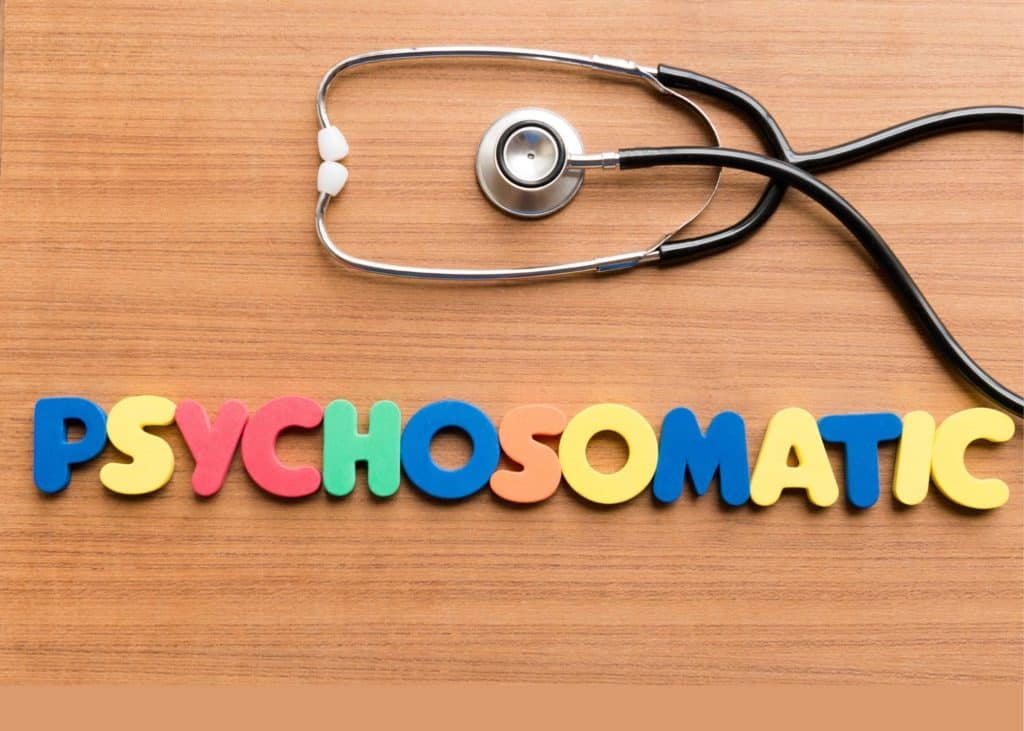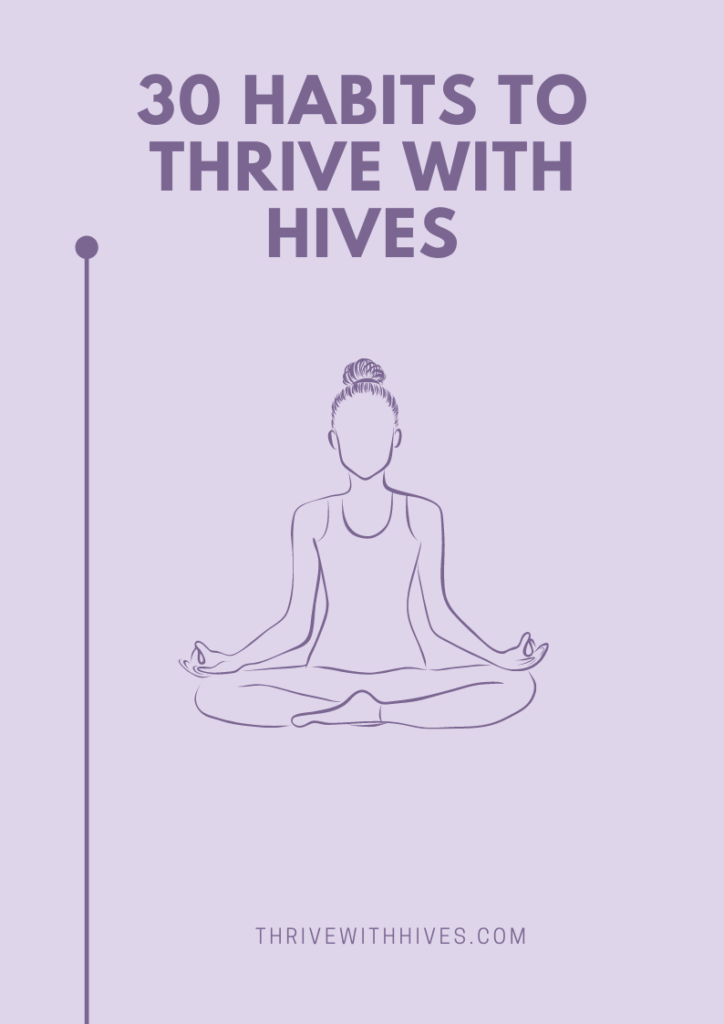My Experience: Chronic Urticaria Diagnosis
Your minding your own business, going about your life when you notice a small itchy bump on your body. Is it a bug bite? You brush it off as no big deal at first. Then you begin to notice more and more itchy bumps, perhaps your cat brought in fleas? Or a particularly hungry mosquito was in your room last night? Maybe it’s that new laundry detergent or a different soap?
You go through all of the usual suspects but continue to have more hives every day. Sometimes your lips swell and your eyes get puffy, perhaps a food allergy? What did I eat that’s different? You finally go to the doctor where your new condition is brushed off and you are told it will likely go away on it’s own. It doesn’t. Back to your doctor, this time with more symptoms; joint pain, fatigue, flushing, GI issues, and occasional shortness of breath and the constant misery of recurring hives.
You doctor assures you that there is nothing physically wrong. Your blood work looks great. You leave with instructions to “avoid stress” and are handed a prescription for an anti-depressant, despite telling him that you do not feel depressed. Your symptoms are still not addressed or taken seriously. When you continue to have hives that keep you awake and have taken over your life, you desperately go to the doctor for a third time. This time it is implied that it’s all in your head and your symptoms are “psychosomatic” or somehow caused by your thoughts. You feel ashamed and embarrassed for asking for help.

Does this sound somewhat familiar? This was my experience when I first started my journey with hives and went to my family physician for help. I hear many similar stories in the Chronic Urticaria community. Some are lucky enough to have a wonderful primary care doctor who truly listens and has empathy. I felt as if my doctor was judging me and was annoyed by my complaints. He made me feel ashamed. I was so embarrassed and even felt guilty about what I thought was a mental health condition. Because of the way I was treated I stopped going to the doctor all together.
As a nurse I know the importance of preventative care, going to appointments annually for a checkup, alerting your physician of new symptoms, etc. You see those medical shows where someone comes in with mystery symptoms and a whole team of doctors work together to solve the puzzle and get to the bottom of it but that’s far from reality. I felt as if I was never heard. I wasn’t taken seriously, instead I was labeled as a hypochondriac and sent on my way to suffer in isolation.
I had always held physicians in such high regard, they were almost god like in their authority and vast knowledge of disease. Surely if he told me I was simply neurotic, it must be true. I wasn’t depressed when I started having hives but I very quickly spiraled into a deep depression. I felt hopeless and helpless. I felt that if my doctor didn’t take me seriously, nobody would. I was right. I quickly learned to suffer in silence. If someone pointed out my hives I brushed it off, I stopped trying to explain it. I found myself isolated and depressed. I felt like there was something wrong with me as a person, some mental defect that caused me to think the hives into existence. It was as if it was my fault somehow.

Have you ever seen that meme that goes around about “Do not confuse your Google search with my medical degree”? I laugh every time I see it. The sad and ironic truth is that when we aren’t taken seriously by our physician, we are forced to turn to “Dr Google” for answers. We shouldn’t have to go to Google but if I’m being honest, I don’t know what I would do without it. I have found community where I had none. I have found that so many have similar stories to mine. Google led me to blogs, support groups, different ideas on how to manage on my own and helped me validate what I was experiencing. It has been far more helpful than my doctor’s exasperated and largely unhelpful diagnosis of a “psychosomatic” condition.

Google the term “psychosomatic” and you will find that it is associated with people who “tend to seek frequent medical attention and become frustrated with the lack of diagnosis”. Could this be because there truly is something wrong? We are often labeled mental health cases because our symptoms are complex and our disease isn’t common. I’m not saying that this mental condition does not exist, but that doctors shouldn’t jump to this when they don’t have the answer. It is likely much less common than we are led to believe.
The average autoimmune patient sees about 6 doctors over an average of 4 years before receiving a diagnosis. There is something wrong with the medical system. Have you ever been told that you can only discuss 2 symptoms at your doctor’s appointment? Have you been referred to multiple specialists? It amazes me how nobody seems to be able put the pieces together.
Why can’t my migraines, hives, joint pain, fatigue, and gastrointestinal issues all be discussed at the same time with the same doctor? This is where the healthcare system as it is just doesn’t work. Autoimmune disorders often have many different, seemingly unrelated symptoms. Did you know that autoimmune conditions are the leading cause of death and disability in the United States? Yet, not only are doctors not promptly diagnosing them, but are often turning patients away with prescriptions for antidepressants and not bothering to investigate any further.
After a few years of managing my hives on my own by taking way too much Benadryl and eating a strict diet, I decided to try the medical approach again. I had moved to a new city and was working a lot of hours, making it difficult to stick to my diet. I needed to find the right medication to make condition tolerable.

I asked around for recommendations for a new doctor. I chose a woman because I felt as if she may take me more seriously than a man, or at the very least, express some empathy. I was anxious about going to the doctor but I knew that I needed help. We discussed my symptoms, she ordered labs and a test for asthma. My labs were normal, we discussed stress and depression once again and I declined the prescription for an antidepressant. She also diagnosed me with arthritis and asthma. The inhaler she prescribed for my “asthma” was too expensive at close to $400 for a 30 day supply so I never filled it. I had learned to live with occasional shortness of breath, and I had never experienced an “asthma attack”, I did not believe the diagnosis was correct.
I continued on a short while and decided that I was going to insist on allergy testing. I took pictures of my hives, as I usually have my flares in the evening. Armed with photos this time, I had my second appointment. She looked at the picture and agreed that these are hives. She gave me a referral to see an allergist/immunologist. Finally, I felt like I was getting somewhere. The possibilities were exciting. Has it been a simple allergy this whole time? Something easy that I can fix? Just avoid the culprit and live hive free for the rest of my life?
When I saw the allergist I was surprised that he did not want to test me for allergies. He explained that what I had was known as Chronic Idiopathic Urticaria(now called Chronic Spontaneous Urticaria). Idiopathic, meaning no known cause. He said that it was very unlikely that an allergy test would reveal anything useful. I insisted and he humored me.

After suffering without my antihistamines for 5 days I had my skin prick test for allergies. It was painful, slow, itchy as hell and nerve wracking. I paid hundreds of dollars for it out of pocket. It revealed nothing significant, as he had predicted. I had a slight reaction to shrimp and mold. He told me that I could avoid vinegar and shellfish that might help. Of course, it didn’t change anything.
What did help was that now I had a diagnosis. I wasn’t crazy. I felt heard. It was discouraging that there is no known cause or cure but I finally had reassurance that it wasn’t all in my head and it could be managed with the right medications. He told me that it is officially unknown what causes Chronic Urticaria but that it is most likely autoimmune. He also shared with me that for many patients with CIU, it does resolve on it’s own in under 5 years. I was already close to that, so I felt hopeful that this would be the case for me. I periodically skipped a dose of my medicine to see if I was in remission. Now over a decade after my symptoms started, I am one of the unlucky few who continue to have hives for many years past that 5 year mark.
I learned to accept my hives but I was also determined to get my life back. I had been eating a Paleo diet to help my psoriasis, which incidentally, flared at the same time that I developed Chronic Urticaria. I saw great improvements in my overall health but I knew that there was more that I could do to improve my health.
I starting seeing a therapist to process past traumas that I had stuffed away. I started a meditation practice. I learned that health and wellness isn’t just about how your numbers look when you go to the doctor but more about how you feel. I also learned how important it is to make mental health a priority when dealing with chronic illness. It took me a long time to process my feelings and find balance in my life. I hope to help others do the same, in less time.
Working with a functional medicine practitioner helped me to pinpoint areas in my life that needed work as well as physical imbalances that needed attention. It helped me to develop a care plan for myself that brought about a sense of control and balance. I still have hives if I skip my medications, but that’s okay. I feel loads better than I did before.
I wanted to learn more about how functional medicine could help so I enrolled in The Functional Medicine Coaching Academy, a year long course to become a certified functional medicine health coach. I also became certified in AIP (Autoimmune Paleo) as this disease is often autoimmune and I had benefited from the protocol myself. I wanted to help other women learn to cope with their illness, find community, and learn to advocate for Chronic Urticaria.
I started the Facebook support group for women with Chronic Urticaria to find community with others and provide support. There were other support groups but I feel that women are uniquely affected and wanted a safe place where we can discuss issues specific to women. I was seeing and hearing women who were suffering far more than I was and were being treated as though Chronic Urticaria is no big deal, all in their head, or made up all together.
Those of us who are suffering with this condition know that it is more than just a rash. Some of the stories people have shared about the treatment they get not only from friends and family but from some medical professionals is shameful.
My goal with Thrive with Hives is to educate, advocate, and provide community support for Chronic Urticaria.
I am a work in progress and even if I am never hive free, I have found balance in my life and learned to thrive with hives. I hope that you can do the same.
What was your diagnosis journey like? Share in the comments 🙂

